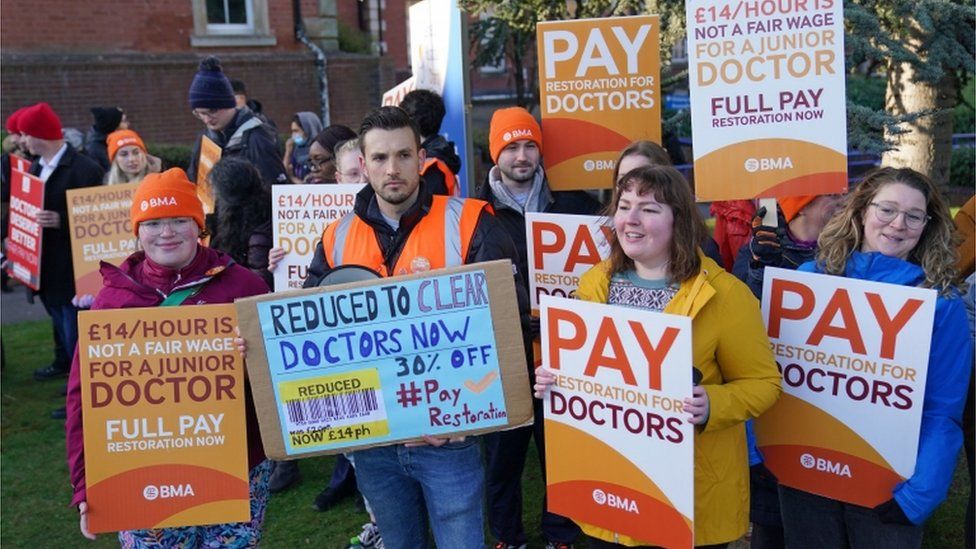Junior doctors' strike: Thousands of NHS appointments hit by walkout
- Published

Nearly 88,000 NHS appointments had to be cancelled because of last week's junior doctor strike in England.
Most - just over 86,300 - were hospital check-ups and operations, but 1,500 community and mental health appointments were also affected.
Overall more than 1.2 million appointments have been affected since strikes began in the NHS a year ago.
Next week junior doctors will take part in a six-day walkout - the longest in the history of the NHS.
It begins on 3 January and comes after talks between the British Medical Association (BMA) and government broke down, earlier this month.
NHS England medical director Prof Sir Stephen Powis said that walkout comes at what is "one of the busiest times for the health service".
"Strike action is once again going to bring significant challenges to the NHS as it struggles to provide for patients amid severe disruption
"As well as having an impact on planned care, industrial action is putting pressure on wider services and prioritising emergency care takes staff away from other areas."
Nearly half of NHS doctors are junior doctors - a group that spans those just out of university through to some who have 10 years or more experience.
Two-thirds are members of the BMA - and they were also joined by members of the much-smaller Hospital Consultants and Specialists Association union.
It meant senior doctors had to be drafted across from other services to staff emergency care - although in some places A&E units still had to close.
Matthew Taylor, of the NHS Confederation, which represents managers, said his members were in "despair" over the impact of strikes on services.
He said the figures released on Wednesday were likely to be an underestimate as many NHS trusts would have reduced the amount of activity they had been planning anyway because of the strike action.
'Extremely disappointed'
Ahead of that walkout, the BMA said it was "extremely disappointed" to be taking action again, after a previous stoppage in early October.
It has urged the government to make a new offer. The BMA had ended talks after setting a deadline of early December for a resolution.
An offer of a pay rise averaging 3%, from January, was being discussed, which would have been on top of the average of nearly 9% junior doctors received in April.
But the BMA said that was too little - junior doctors had asked for an extra 35%, to make up for below-inflation pay rises since 2008.
Industrial action in the NHS in England, which began last December with walkouts by ambulance staff and nurses, is estimated to have cost more than £2bn in planning, preparations and paying for cover.
A pay offer to NHS staff other than doctors was accepted in May, while strike action by consultants has been put on hold as they vote on a fresh offer from the government.
Junior doctors in Wales will also go on strike in January, while in Northern Ireland they are being balloted. But in Scotland a pay deal has been agreed.
Are you a doctor with a view on the strikes? Are you a patient affected? Share your experiences by emailing haveyoursay@bbc.co.uk, external.
Please include a contact number if you are willing to speak to a BBC journalist. You can also get in touch in the following ways:
WhatsApp: +44 7756 165803
Tweet: @BBC_HaveYourSay, external
Please read our terms & conditions and privacy policy
If you are reading this page and can't see the form you will need to visit the mobile version of the BBC website to submit your question or comment or you can email us at HaveYourSay@bbc.co.uk, external. Please include your name, age and location with any submission.
- Published27 November 2023
- Published28 November 2023
- Published2 May 2023
- Published9 August 2023
- Published2 May 2023
- Published21 July 2023
- Published11 August 2023